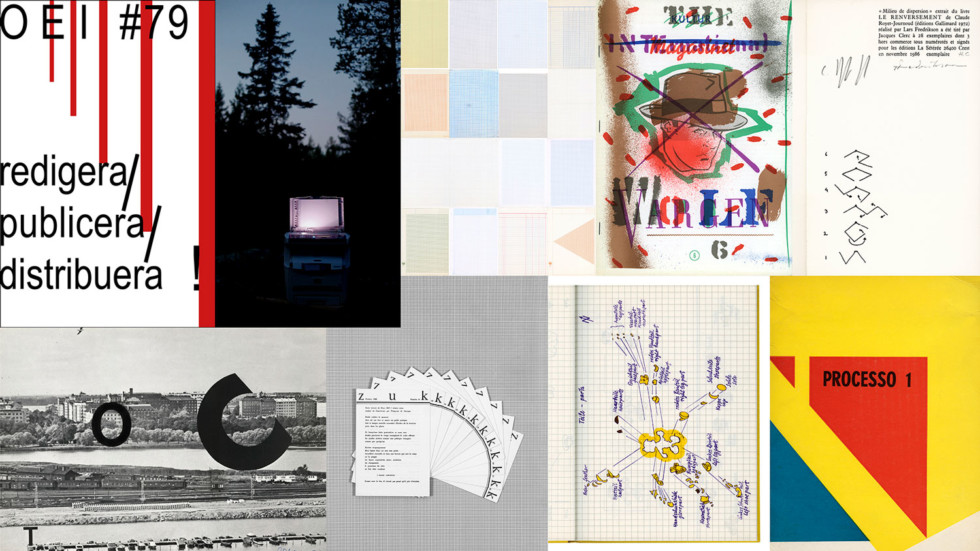
Edited Friday!
Five evenings on investigative publishing in OEI #79: Edit/publish/distribute!
23.2 2018 – 23.3 2018
Stockholm
Edited Friday!
Date: 23 February, 2 March, 9 March, 16 March, 23 March 2018
Time: at 18.30
Place: in the exhibition OEI #79
Language: 23 March: Danish and Swedish, 2 March: English and Swedish, 9 March: English, 16 March: English, 23 March: Swedish.
Price: free admission
Edited Sunday!
Date: 1 April 2018
Time: at 15.00–17.00
Place: in the exhibition OEI #79
Language: English and Swedish
Price: free admission
Based on their individual perspectives and practices, the invited guests will highlight and discuss editorial strategies, and the critical potential, innovative forms and productive communities of publishing.
Edited Friday! showcases an ecology of artistic publishing alternatives in Denmark, Sweden, Portugal and France, listening in on some contemporary initiatives that re-energise editing, publishing and distribution.
The programme also digs deep into the history of alternative publishing, including Ernesto de Sousa’s genre-transgressing work as a critic, artist, film-maker and curator in Portugal throughout the 1960s-, 70s and 80s, and the Swedish arts journal Vargen (The Wolf, 1974–75) with its idiosyncratic blend of dada, pop and anarchism.
The series is a part of the 79th issue of the magazine OEI, witch is a special issue published in the form of a spatial presentation at the museum.
OEI #79: Edit/publish/distribute!
Programme
Friday 23 February, 2018
Highlighting Danish publishing dynamics
Antipyrine and Monsieur Antipyrine; forlaget/tidsskriftet * [asterisk]; Emancipa(t/ss)ionsfrugten; Laboratory for Aesthetics and Ecology; Ovo Press and Pist Protta.
Today’s independent publishing scene in Denmark spans a plethora of projects driven by a contagious desire for investigation and experiment. As Mathias Kokholm writes in a fresh manifesto on publishing: ”…books are an explorative structure that transcends or erodes the institutional boundaries primarily between art, literature and theory”.
Participating editors, artists and poets: Ida Bencke, Gitte Broeng, Jesper Fabricius, Rasmus Graff, Kasper Hesselbjerg, Absalon Kirkeby, Mathias Kokholm and Lasse Krog Møller.
With support by Iaspis – The Swedish Arts Grants Committee’s International Programme for Visual and Applied Artists.
Friday 2 March, 2018
Maps, journals and artistic publishing practices
The artist Isabel Carvalho (Porto) presents her work in the interface between publication and space. The poet and artist Franck Leibovici (Paris) talks on the “ecologies of artistic practices”, based on the map over Claude Royet-Journoud’s magazines he made for OEI #79. The evening opens with a talk between Rolf Börjlind, Ann-Marie Regild and Olle Granath (Stockholm) on what was arguably the most radically open journal project in 1970s Sweden, the arts magazine Vargen (The Wolf).
With support by Iaspis – The Swedish Arts Grants Committee’s International Programme for Visual and Applied Artists.
Friday 9 March, 2018
Investigative books / the book as investigation
Release of two new books in the series OEI undersökningar: Anteckningar om kojan, naturen och några andra saker (Notes sur la nature, la cabane et quelques autres choses), by the philosopher and writer Gilles A. Tiberghien, and Barndom och historia (Infancy and History: The Destruction of Experience), by the philosopher Giorgio Agamben.
Gilles A. Tiberghien (Paris) lectures on huts as privileged places for encounters between art and nature – a kind of laboratory for theoretical and practical experimentation. If houses are where we are rooted, huts are transitional spaces, temporary bricolages where we can withdraw from the world while being in it.
Huts are like doors into nature, open places for thinking, writing and creating art. There are plenty of examples, from Descartes’ room with a stove, and Thoreau’s small house by Walden Pond, to Wittgenstein’s cabin in Norway, or Kawamata’s tree huts in France, Germany, China and the USA.
The poet and translator Gustav Sjöberg presents his Swedish translation of Agamben’s Infancy and History.
Friday 16 March, 2018
“Aesthetic operators” in experimental Portuguese art and poetry during the 1960s, 70s and 80s
Rui Torres (Porto) talks on PO.EX – experimental poetry in Portugal in the 1960s, 70s and 80s. The custodian of the Ernesto de Sousa archives, Isabel Alves (Lisbon) and the philosopher José Miranda Justo (Lisbon) in a talk on the artist, film-maker, curator and critic Ernesto de Sousa, and the pivotal exhibition “Alternativa Zero” in Lisbon, in 1977.
Friday 23 March, 2018
Other publishing paths, other publishing worlds
An evening with a firework display of seven Swedish investigative publishing houses and structures.
Art Distribution (Percival), BILAGA (Mari Lagerquist and Lina Persson), Chateaux (Beata Berggren, Martin Högström and Peter Thörneby), Firework Edition (Leif Elggren and Thomas Liljenberg), Mount Analogue (Diana Kaur and Tris Vonna-Michell), tillexempel förlag (Kristian Carlsson) and Rönnells förlag (Pekka Särkiniemi).
Presentations, performances, releases, talks, encounters.
Sunday 1 April 2018
Edited Sunday!
An afternoon in the sign of publishing on account of the last opening day of OEI #79: edit/publish/distribute!
Annette Gilbert (Berlin) will talk about publishing as artistic practice, departing from her book Publishing as Artistic Practice (Sternberg Press, 2016). The poet Bengt Adlers (Malmö) reads from his new book My Sacret Diery. A kind of textimony (OEI editör 2018). In addition: release of the book 39 pressbilder från OEI editör, free multiples and reflections on the publishing of OEI #79.
Gilbert is a scholar in comparative literature. She is the editor of Publishing as Artistic Practice (Sternberg Press 2016), Reprint. Appropriation (&) Literature (Luxbooks 2014) and Under the Radar. Underground Zines and Self-Publications 1965–1975 (Spector Books 2017).
”It has become increasingly more frequent for the practice of authors, artists, and designers to overlap with the practice of publishers, and vice versa. It is by no means uncommon for publishing to be understood as an artistic project or declared as a work of art itself. […] The time is now ripe to push publishing into the center of aesthetic and academic discourses. For this reason, it is necessary to sharpen the focus and to no longer question only the significance of publishing for artistic practices, but also search for the possibility and significance of publishing as artistic practice.” (Annette Gilbert, Publishing as Artistic Practice, Sternberg Press, 2016)
